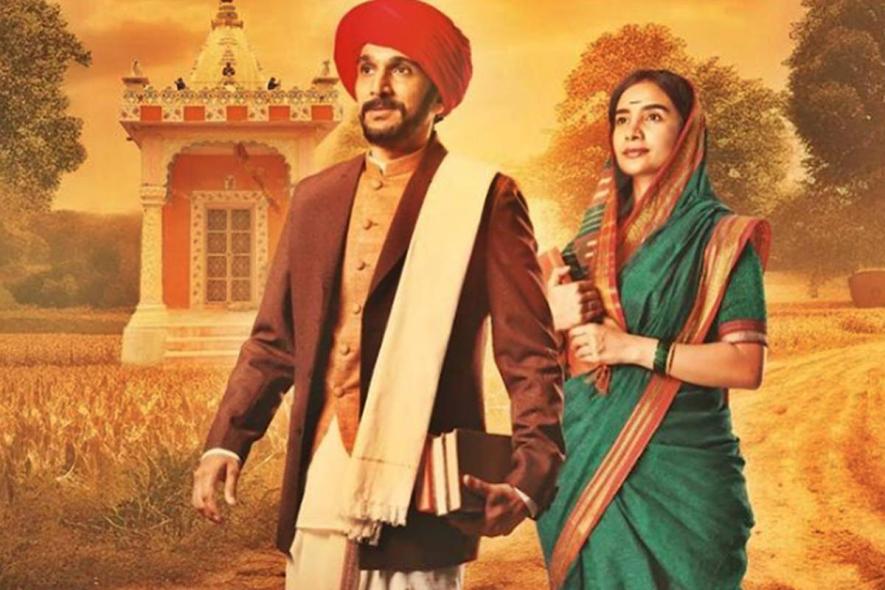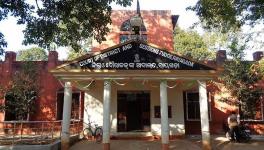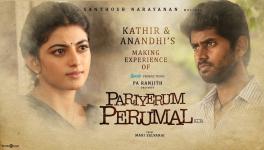'Phule': A Revolution on Screen

Image credit: Instagram
My only complaint against the filmmakers is that the film’s title should have been Phules— not Phule. Savitri is not Jyotiba’s better half, but full in herself.
A FIRST IN LIFE
For the first time in my life, I went and saw the Hindi film, Phule, made by Anant Mahadevan, in a modern mall theatre in Hyderabad, and that too along with 20 Phuleites -- lawyers, doctors, including a Telugu film director. I do not normally see films unless they have historical relevance. I have seen major changemaker’s films, such as Amazing Grace, made on the life of William Wilberforce in England in 2006. It was directed by Michael Apted. I saw Richard Attenborough’s film, Gandhi. I also saw Dr. Babasaheb Ambedkar, directed by Jabbar Patel in 2000.
The movie, Phule, can be compared more with Amazing Grace than any other. Both of them are about the life and struggle of slave liberators.
Amazing Grace is a biographical drama film about the abolitionist campaign against slave trade in the British Empire, led by William Wilberforce (1753-1833), who was responsible for steering an anti-slave trade legislation through British Parliament. He fought against slave traders and masters in the British Empire and forced British Parliament to make a law against slave trade.
That was the first ever law against slave trade in human history.
A COUPLE’S FIGHT TO THE END
The Phules fought against the Shudra/Dalit slavery beginning in 1848. The film is a feast for thinkers, writers and activists, as it combines both fighting in a non-violent way and constructing a theory about how the Shudra farmers, untouchables and women get liberated through education, which was prohibited for them for millennia.
Though Mahatma Phule, even before his marriage, was a spirited boy, after his marriage with Savitribai Patel (after marriage Savitribai Phule) he became a revolutionary, with her readiness to learn and educate herself as a 9-year-old girl. She too was an uncommon girl since her childhood. Her desire to learn and go against her father’s spirit of casteism is well documented. Her spirit lit a real fire in Jyotiba to educate women in India, and she was willing to join the fight from the beginning.
A SCENE THAT SPEAKS ABOUT A CRITICAL POINT
The film captures the collective consciousness of Phule’s school mate team along with Savitri and Fatima Sheikh and her brother Usman Sheikh, to take a massive step to liberate the entire Shudra/Dalit samaj from the superstitious grip of Brahmanism.
There is an amazing scene that invokes the most significant and game-changing thought process. After the 1957 war, the Poona Brahmins made a drum-beat announcement on the streets where the Shudras lived that to fight the British, they must join Vyayam Shalas (for physical training). That they must learn the methods of fighting and making their bodies fit, while seriously opposing access to education for them.
A Shudra pehelwan (wrestler) keeps training the youth in an open air vyayam shala, teaching them all kinds of exercises —weight-lifting, stick-rolling and fighting. Jyotirao goes there to talk to the master. He asks the master, “Why are you training the youth in this art?” The pehelwan replies that “if we make our youth learn these arts, they can fight the British.” Phule tells him, “Rather, we must teach them reading and writing to fight the British in a better way.” The pehelwan says, “No, it is a sin. We should not do that. If we learn reading and writing we will violate the Dharma”. Phule tells him that there is no such religious rule. The pehelwan throws him on the ground and puts his foot on him and asks him to “get lost”, since he was opposing Dharma.
Phule simply gets up and walks away.
PHULE’S SHUDRA NATIONALISM
The Shudras and Dalits were supposed to fight the British only physically, not intellectually. But the British rule was being sustained through their intellectual might more than military might. Jyotirao understood this. Unless the Shudra/Dalits and women of all castes—including Brahmins—are educated, the fight against the British will not succeed. That is what he tries to impress upon the pehelwan. In response, the latter uses his enslaved brain to physically beat Jyotiba down.
In another scene, a Brahmin team goes to their school and attacks them, beats up Phule and destroys the furniture. Savitri protects the traumatised girls by huddling them in a room. Afterward, she treats Phule’s wounds. Phule tells her that they must be prepared for not just yuddh (battle) but for a Maha Yuddh (mega battle). The Phules’ life was under threat all the time. Yet, they did not abandon the fight.
Two mercenaries were paid Rs 100 and sent by Brahmins to kill Phule. But he won over them. Phule says, “At least, they spent hundred rupees on me.”
Phule’s philosophy was to educate farmers to produce more food. Educate Dalits to produce better technology of leather and better services by joining the whole society. Phule’s deeper reformist revolution was to prepare India to defeat the British once for all.
The Brahmin pundits, on the other hand, were thinking that they could come to power while keeping humans, production and distribution of goods and commodities backward even after the British left. Savitri tells the Pandits when she confronts them, “You want to rule us exactly like the British are doing”. The Brahmins of that time had a self-interest, not national interest. The Phules were envisioning a bigger national interest.
After some time, the Phules opened a school for girls in an open field. But no parent was being allowed to send girls to school as an atmosphere of terror was created in entire Poona town.
Suddenly, we see the pehelwan walking with several girls to the school and admitting them. He later follows the Phules all through their struggle.
The Phules started Shudra/Dalit and women’s education, a revolutionary process in an absolutely non-violent way. Throughout the film, when the Phules and their supporters face violence, they kept the movement completely non-violent. Except in one incident, when the Shudra workers themselves were opposing girls’ education and come to threaten Savitri and Fatima Sheikh, Savitri slaps one. Patralekha, who played Savitri’s role, has shown her talent as an actor.
The Shudra/Dalits were brainwashed for centuries, generation after generation, that education for Shudras is paap— a sin. It became a self-inflicting human torture. Whenever there were attempts to overcome the fear of ‘sin’ and punarjanma (rebirth) as pigs and dogs, a violent attack was launched from multiple corners. The life of the Phule couple is a standing example of that process of Indian history.
The whole project of Phules’, graphically shown in the film in a manner that even a child can understand, was to violate the rules of Shudra/Dalit slavery. From Phule teaching his ‘child wife’, Savitri, opposing the controls of the Brahminic society and self-inflicted father and elder brother, stretching his reform movement farther and farther in the face of resistance, is a new mode of non-violent revolution. No couple in the world has ever played such a revolutionary role in changing their own uncivilised society.
William Wilberforce was fighting his educated and slave trading class with reasoning. It was to make a law to abolish slave trade in the early 19th century in England. But the Phules’ fight was much more difficult. The determined couple, by embracing a philosophy of mass liberation of all Indians, including Brahmins, who were steeped in deep superstition, paved a way for the future. They steered the struggle with grit. They were fighting to counter the practice and theory of embedded slavery and barbarism. No other couple in human history has shown such a spirit filled with revolutionary ambition for change. That too in a stagnant society like that of India.
While watching the film, I was either breaking into tears or trying to clap when they (the Phules) won in some fight.
No other film has made such a deep impact on my life and conscience as the film Phule has.
The writer is a political theorist, social activist and author. His latest book is the Shudra Rebellion. The views are personal.
Get the latest reports & analysis with people's perspective on Protests, movements & deep analytical videos, discussions of the current affairs in your Telegram app. Subscribe to NewsClick's Telegram channel & get Real-Time updates on stories, as they get published on our website.
























